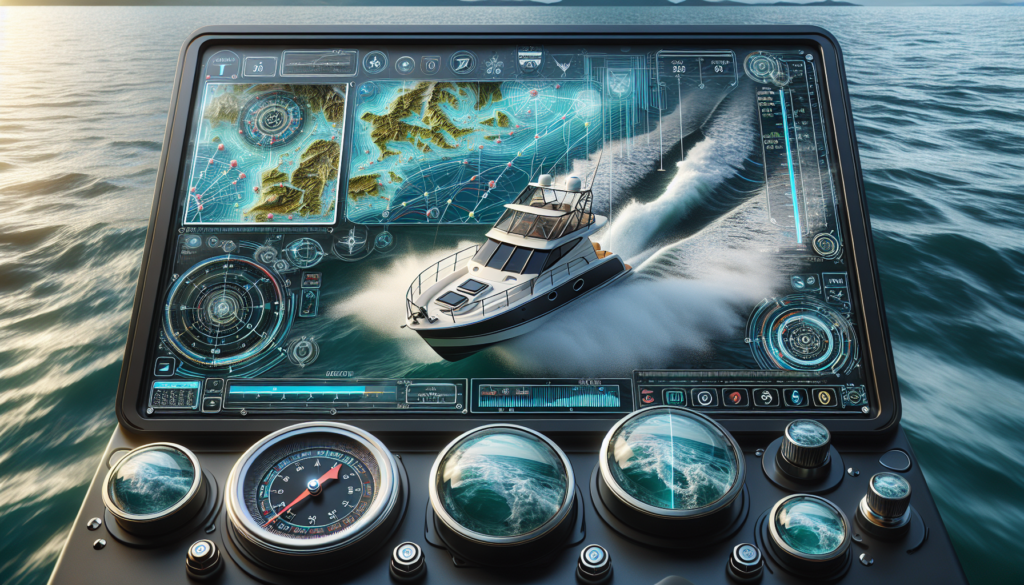Exploring the Depths: A Comprehensive Guide to Marine GPS Systems
Welcome aboard, fellow seafarers! Today, we embark on a journey into the fascinating world of Marine GPS systems. Imagine sailing the vast expanse of the ocean with confidence, knowing your exact location, navigating with precision, and staying safe in all weather conditions. This is made possible by the revolutionary technology of Marine GPS systems.
But what exactly are Marine GPS systems, and how do they work? In this comprehensive guide, we will delve deep into the intricacies of Marine GPS systems, exploring their history, applications, benefits, controversies, and future developments. So, hoist the sails, and let’s set sail into the world of Marine GPS systems!
The Evolution of Marine GPS Systems
Before we dive into the current state of Marine GPS systems, let’s take a step back in time to understand their evolution. The history of GPS technology can be traced back to the Cold War era when the United States military developed the Global Positioning System (GPS) for accurate navigation and tracking of military assets.
Over the years, GPS technology evolved from its military origins to become a ubiquitous tool for civilian use, including maritime navigation. Marine GPS systems leverage the constellation of satellites orbiting the Earth to provide accurate positioning, navigation, and timing information to ships, boats, and other marine vessels.
Today, Marine GPS systems have become an indispensable tool for mariners, enabling them to navigate with precision, avoid hazards, and reach their destinations safely and efficiently.
The Working Principle of Marine GPS Systems
At the core of Marine GPS systems is a network of satellites that orbit the Earth, constantly transmitting signals that are picked up by GPS receivers on board ships and boats. These signals contain precise timing information and the satellite’s position in space, allowing the GPS receiver to calculate its own position on Earth based on the time it takes for the signals to reach it.
By triangulating signals from multiple satellites, the GPS receiver can determine its exact latitude, longitude, and altitude with remarkable accuracy. This information is then displayed on a digital map, providing the mariner with real-time positioning data and route guidance.
Furthermore, modern Marine GPS systems are equipped with advanced features such as automatic route planning, waypoint navigation, and collision avoidance, making navigation easier and safer for mariners.
Applications of Marine GPS Systems
The applications of Marine GPS systems are vast and diverse, ranging from commercial shipping and fishing to recreational boating and maritime research. Here are some key areas where Marine GPS systems are used:
Commercial Shipping
In the realm of commercial shipping, Marine GPS systems play a crucial role in ensuring the safe and efficient movement of cargo ships, tankers, and other large vessels across the world’s oceans. By providing accurate positioning and navigation data, Marine GPS systems help mariners plot optimal routes, avoid collisions, and comply with international maritime regulations.
Moreover, Marine GPS systems are integrated with other onboard systems such as radar, Automatic Identification System (AIS), and Electronic Chart Display and Information System (ECDIS) to enhance situational awareness and decision-making on the bridge.
Fishing
For fishermen, Marine GPS systems are valuable tools for locating fishing grounds, tracking fish movements, and navigating to specific waypoints with precision. By marking productive fishing spots on their GPS units, fishermen can return to the same locations repeatedly, increasing their chances of a successful catch.
Additionally, some Marine GPS systems are equipped with fishfinder capabilities, allowing fishermen to see underwater structures, identify fish schools, and monitor water temperature and depth in real-time.
Recreational Boating
Recreational boaters also benefit greatly from Marine GPS systems, which provide them with peace of mind and confidence while exploring the waters. Whether cruising along the coast, sailing offshore, or navigating through busy harbors, boaters can rely on their GPS units to guide them safely to their destinations.
Furthermore, Marine GPS systems offer recreational boaters a range of features such as anchor alarms, man overboard alerts, and weather forecasts, enhancing their overall boating experience.
Maritime Research
Maritime researchers and scientists use Marine GPS systems to study ocean currents, map seabed topography, track marine animals, and conduct environmental monitoring. By equipping research vessels with high-precision GPS receivers, researchers can collect valuable data to better understand and protect our marine ecosystems.
Overall, the applications of Marine GPS systems are as diverse as the marine industry itself, demonstrating the versatility and importance of this technology in modern maritime operations.
Benefits of Marine GPS Systems
The benefits of Marine GPS systems are manifold, offering mariners numerous advantages in terms of safety, efficiency, and convenience. Here are some key benefits of using Marine GPS systems:
Enhanced Safety
One of the primary benefits of Marine GPS systems is enhanced safety at sea. By providing accurate positioning and real-time navigation data, Marine GPS systems help mariners avoid hazards, navigate through challenging waters, and respond quickly to emergencies.
In case of adverse weather conditions or mechanical failures, Marine GPS systems can guide mariners to the nearest safe harbor, minimizing the risk of accidents and ensuring the well-being of the crew and passengers.
Increased Efficiency
Marine GPS systems improve the efficiency of maritime operations by enabling mariners to plan routes, optimize fuel consumption, and reduce travel time. By using GPS-based route planning and navigation tools, mariners can avoid unnecessary detours, streamline their journeys, and arrive at their destinations faster and more cost-effectively.
Moreover, Marine GPS systems allow mariners to track their vessels in real-time, monitor fuel consumption, and optimize their operations for maximum efficiency and profitability.
Convenience and Ease of Use
Unlike traditional navigation methods that rely on charts, compasses, and manual calculations, Marine GPS systems are user-friendly and intuitive, making navigation simple and stress-free for mariners. With touch-screen displays, customizable menus, and voice-guided instructions, GPS units offer a seamless navigation experience for both experienced and novice mariners.
Environmental Benefits
Marine GPS systems also contribute to environmental conservation by promoting sustainable navigation practices and reducing the risk of marine pollution. By providing accurate positioning and route guidance, GPS units help mariners avoid sensitive marine habitats, coral reefs, and shallow waters, protecting the marine ecosystem from damage and disturbance.
Furthermore, Marine GPS systems support the implementation of environmentally friendly navigation practices such as slow steaming, optimized routing, and emission control areas, reducing carbon emissions and minimizing the impact of shipping on the environment.
Controversies and Debates
Despite their numerous benefits, Marine GPS systems have also sparked controversies and debates within the maritime industry. One of the key issues surrounding Marine GPS systems is the potential for signal interference and spoofing, which can compromise the accuracy and reliability of GPS data.
In recent years, there have been reports of malicious actors using jamming devices or spoofing techniques to disrupt GPS signals, leading to navigation errors, collisions, and security threats in maritime operations. To address this challenge, ongoing research is focused on developing robust anti-spoofing technologies and resilient navigation systems to protect GPS signals from malicious interference.
Another debate surrounding Marine GPS systems is the reliance on electronic navigation aids and the potential loss of traditional navigation skills among mariners. As GPS technology becomes more advanced and widespread, there is a concern that mariners may become overly dependent on GPS systems, leading to a decline in manual navigation proficiency and situational awareness on board vessels.
Despite these controversies, Marine GPS systems remain indispensable tools for modern mariners, offering unparalleled benefits in terms of safety, efficiency, and convenience in maritime operations.
Future Developments in Marine GPS Systems
The future of Marine GPS systems is bright, with ongoing innovations and advancements poised to revolutionize navigation and safety at sea. Some key developments to watch for in the coming years include:
Enhanced Accuracy and Reliability
Advancements in satellite technology, receiver capabilities, and signal processing algorithms are expected to improve the accuracy and reliability of Marine GPS systems, making them even more precise and robust in challenging environments such as urban canyons, polar regions, and open seas.
Integration with Emerging Technologies
Marine GPS systems are increasingly being integrated with emerging technologies such as artificial intelligence, machine learning, and Internet of Things (IoT) to enhance their capabilities and provide new functionalities to mariners. By leveraging these technologies, GPS units can offer predictive analytics, autonomous navigation, and smart routing features, transforming the way mariners navigate and operate their vessels.
Resilient Navigation Systems
To address the growing threat of GPS signal interference and spoofing, resilient navigation systems are being developed to ensure the continuity of navigation services in the face of disruptions. These systems combine multiple positioning technologies such as GPS, Galileo, GLONASS, and BeiDou, along with inertial sensors and radio frequency signals, to provide redundant and resilient navigation solutions for maritime operations.
Conclusion
To wrap things up, Marine GPS systems have revolutionized maritime navigation, providing mariners with accurate positioning, reliable navigation, and enhanced safety at sea. From their military origins to civilian applications, GPS technology has come a long way in shaping the modern maritime industry.
As we sail into the future, the evolution of Marine GPS systems continues, with advancements in technology, resilience, and integration paving the way for safer, more efficient, and sustainable maritime operations. By embracing these developments and staying informed about the latest trends in GPS technology, mariners can navigate the waters with confidence and clarity, ensuring a smooth and successful voyage ahead.



